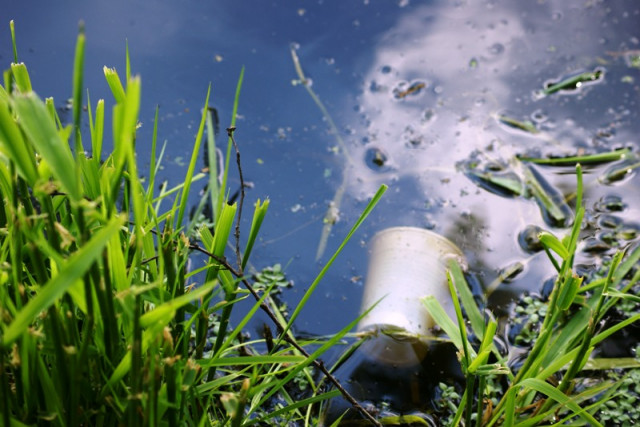Progress on bioremediation pond at Ravi held up by ‘dead-end’ Japanese plant
Wasa unable to arrange meeting with Jica despite LHC orders.

The bioremediation pond proposed by the River Ravi Commission would require 400 kanals, cost Rs50 million, and be able to treat 50 cusecs of wastewater. PHOTO: FILE
On March 1, the green bench of the Lahore High Court had directed Wasa to arrange a meeting between officials of the River Ravi Commission, which came up with the plan to build a bioremediation pond at Babu Sabu, and the Japanese International Cooperation Agency (Jica), which has its own longstanding plan to build a treatment plant, also at Babu Sabu.
While the Jica project would be much bigger, being able to treat 400 cusecs of wastewater, it would also require a lot of land (7,300 kanals to 10,000 kanals) and be very expensive (Rs42 billion, according to the LHC order). The bioremediation pond proposed by the River Ravi Commission would require 400 kanals, cost Rs50 million, and be able to treat 50 cusecs of wastewater. Wastewater flows into the Ravi at a rate of some 1,800 cusecs.
But the proposed location of the pond has been promised by Wasa for the Jica project. Wasa Managing Director Mian Abdullah told the LHC that the bioremediation pond should wait until a meeting with Jica officials, who visited Lahore on March 14 and 15. However, the meeting did not take place.

Abdullah, who was also a part of the River Ravi Commission, was unavailable for comment. Chaudhry Aftab, a Wasa director, said that the Jica officials were in town for just two days and it was not in their schedule to meet commission members.
Aftab said that Wasa had promised 7,300 kanals to Jica for the wastewater treatment plant, but the plant proposed by the Japanese would require a large amount of electricity. “We asked Jica to choose a more sustainable and environmentally-friendly technology as we are a power-deficient country,” he said, but the low-fuel option requires more land.
Wasa is currently negotiating the purchase of another 2,700 kanals from the Punjab government. Aftab said that the 400-kanal requirement of the bioremediation pond was an added complication for Wasa.
But River Ravi Commission officials see the Jica project as a dead-end.
RRC Convenor Rafay Alam said Wasa and Jica had been trying to reach an agreement for installing a plant for the last 35 years. Even if Jica and the government agree, the Japanese parliament will need to approve the project, he said.
“At best, the project won’t start until 2014,” he said. But the bioremediation site can be set up within eight months, he added.
Dr Ejaz Ahmad of WWF-Pakistan, another member of the commission, said he was sceptical that the Jica plant would ever materialise. The bioremediation pond should be built at the Babu Sabu site, he said. “This is a biological and a cost-effective method of cleaning the river. We cannot settle for another site as the terrain contour favours our project. It will cost a lot less to set it up here,” he said.
He said that the LHC would be informed at the next hearing of the River Ravi cleanup case, due on April 12, that Wasa did not arrange the meeting.
Published in The Express Tribune, March 18th, 2013.



















COMMENTS
Comments are moderated and generally will be posted if they are on-topic and not abusive.
For more information, please see our Comments FAQ